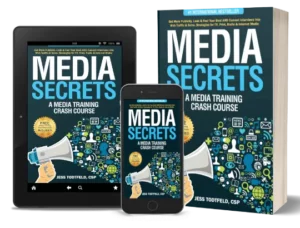Note from the trainer. Tips are ok.
Guided practice is where new skills are made.
- Know your audience: Before you go in front of the camera, a reporter or any media situation know who your audience is before you answer questions.
- Research the outlet: Before starting, research the media outlet you are speaking with. Understand their audience and what they cover.
- Be Prepared! : Know what questions you may be asked and have answers ready. Practice with a video recording device
- Be concise: Keep your answers short and to the point. Practice with a video recording device.
BeAct confident: “Act it and Become it.” Speak with conviction and act confident in what you are saying. Before you know it, you will be the part.- Stay on message: Stay focused on the topic and don’t wander off into tangents. This can only happen with practice.
- Know your sound bites: Have a few key sound bites ready to use during the interview. Use our sound bite tools to create them.
- Practice Practice Practice: Rehearse your responses and practice your body language and messages… but with a video recording
- Dress appropriately: Dress in a way that best represents who you are and what you do. Make sure it matches the audience too.
- Maintain eye contact: Make eye contact with the interviewer. Only look at the camera if it is virtual or if they ask you to.
- Act natural: Speak as if you are having a conversation with a friend.
- Show enthusiasm: Show enthusiasm for the topic and your message.
- Be positive: Focus on the positive and avoid negativity. Ideally that matches your messaging
- Add in more of YOU: Be authentic and let your personality shine through.
- Be proactive: Take control of the interview and steer the conversation in the direction you want it to go.
- Act relaxed: Take deep breaths to stay relaxed. If you look the part you get credit for it.
- Listen. Listen to the interviewer’s questions and answer them thoughtfully. Do your best not to listen to distractive thoughts.
- Practice body language: Use positive body language and avoid negative gestures.
- Be aware of your setting: Be mindful of the background and surroundings.
- Be mindful of time: Make sure you are aware of the time and stay within the allotted time. Practicing helps with this.
- Be aware of your tone: Be mindful of the tone of your voice and avoid monotony.
- Be aware of technical issues: Be prepared for technical issues and have backup plans. This is especially true when delivering an interview virtually.
- Use makeup: Professionals use it. It will help you look your best
- Be flexible: Be open to changing your approach if necessary.
- Follow up: After the interview, follow up with the interviewer and thank them for their time. Maybe they’ll have you back.
This is what we call a good start.
Imagine how great you’d be with a professional guiding you.
We have options for Live-in-person
Virtual Live, and
Recorded virtual training.
Click the button in the upper left to get a quick quote

